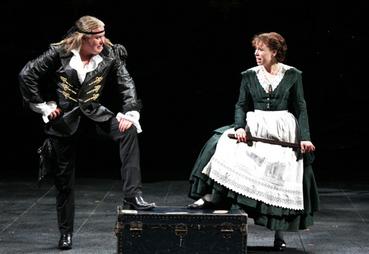All’s Well That Ends Well is one of Shakespeare’s so-called problem plays: it ends with a wedding but it’s hardly a comedy. Marianne Elliott’s production in the Olivier at the National Theatre brings out the many fairytale elements in the story. Michelle Terry’s spirited Helena variously resembles Red Riding Hood, Snow White, Dorothy and Gretel as she battles for the love of her errant husband; the undeserving Betram, played with charmless coltishness by George Rainsford.
Rae Smith’s vast set looks as if Dracula has invited Tim Burton to give his castle a makeover. Spiky claw-topped towers punch up towards a projected backdrop across which owls, bats, wolves and spiders wonder from time to time. It works very well for the first two acts although the sepulchral lighting makes it hard to see anyone who ventures upstage. When the action switches to Florence – where the comic sequences concerning the comeuppance of Bertram and the unmasking of his servant Parolles as a posturing coward occur – the gothic gloom begins to jar: the stage seems to suck the life out of the cast and it is hard for an audience to feel it has permission to laugh. This is a shame as there are some excellent performances on offer.
The play offers starkly contrasting depictions of masculine buffoonery and duplicity with female endurance and steadfastness. Clare Higgins is excellent as the Countess of Rousillon: she is a support and prop to Helena rather than a wicked stepmother. Hasina Haque makes the most of Diana, the Florentine object of Bertram’s lust, she speaks her lines with a commanding authority that belies the playboy bunny costume that so bewitches Bertram (and a fair few of the blokes in the audience to boot).
The production runs at 3 full hours and, only in the closing seconds, will you find out if they all live happily ever after.





